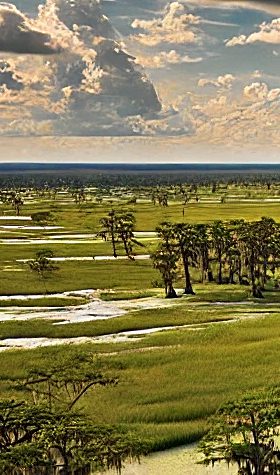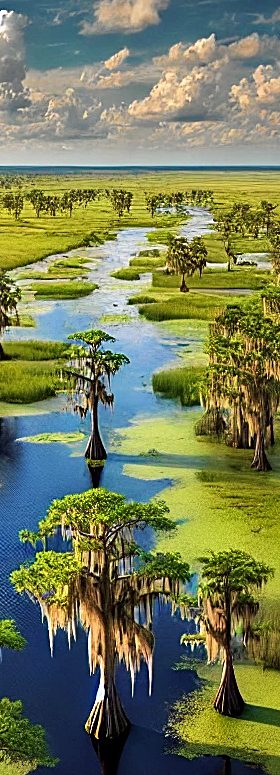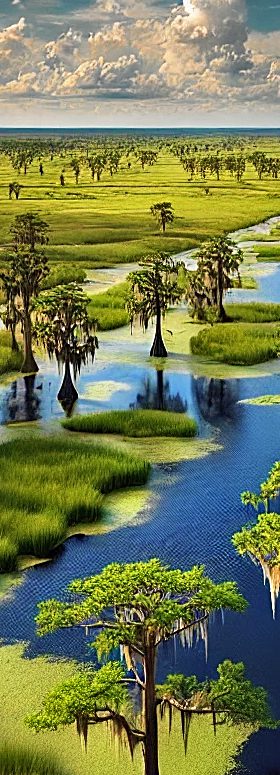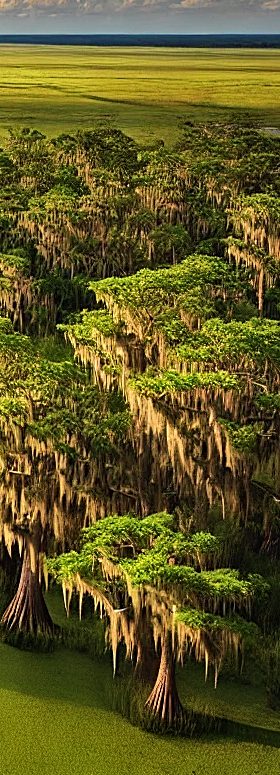
If you’re considering buying land in Louisiana, you’re stepping into a unique opportunity filled with potential and complexity. Louisiana, often referred to as the Pelican State, is famous for its rich cultural heritage and diverse landscapes that range from peaceful rural fields to vast wetlands. Whether you’re attracted by the idea of agricultural investment, building a home away from city life, or owning land near vibrant cities like New Orleans and Baton Rouge, there’s plenty to explore when it comes to land ownership here.
However, before jumping into a purchase, it’s crucial to weigh the benefits and challenges that come with owning land in Louisiana. From zoning laws and environmental concerns to the economic perks of low property taxes, understanding the pros and cons will help you make an informed decision. Whether you’re seeking fertile farmland, a private retreat, or simply a smart investment, this guide will give you a comprehensive look at what you need to know before buying land in Louisiana.

Louisiana Land: A Regional Overview
Louisiana is a state like no other, offering a patchwork of landscapes that range from the flat, swampy lowlands of the south to the slightly more elevated pine forests in the north. The state is often divided into several distinct regions, each with its own characteristics that influence land-buying decisions. Southern Louisiana, particularly near the Gulf Coast, is known for its proximity to the water and includes cities like New Orleans and Baton Rouge. The land here is mostly low-lying and can be prone to flooding, especially during hurricane season. However, it offers great potential for waterfront properties, fishing, and wildlife enthusiasts.
In contrast, Northern Louisiana has more elevation, with forests and rolling hills that provide excellent opportunities for agriculture, timber, and outdoor recreation. The population density is lower here, making it ideal for those seeking peace and quiet, away from the hustle of coastal life. Central Louisiana acts as a crossroads between north and south, combining aspects of both. With rural farmland, small towns, and urban areas like Alexandria, it’s the perfect blend of Louisiana’s diverse offerings.
The Mississippi Delta region, located along the eastern side of the state, follows the mighty Mississippi River. Known for its fertile soil, this area is prime for agriculture. However, the river brings with it a significant risk of flooding. Lastly, Western Louisiana, bordering Texas, features pine forests and expansive open spaces. It shares some similarities with East Texas and is ideal for ranching, timber, and those looking for plenty of room to stretch out. Each of these regions offers a unique blend of opportunities and challenges, so when you’re looking to purchase land in Louisiana, it’s important to consider the geography and climate that best suit your needs.
The Pros of Buying Land in Louisiana
1. A Diverse Ecosystem Like No Other
Louisiana’s diverse ecosystem is a land buyer’s dream—if you’re a fan of lush, green environments, that is. The state boasts everything from coastal wetlands and forests to fertile farmland. This diversity makes it a hotspot for agriculture, wildlife conservation, and outdoor recreation. You could be walking through thick woods one minute and paddling through a swamp the next. It’s almost like nature’s version of a grab bag. You never know what you’re going to get—just watch out for the snapping turtles.
2. Low Property Taxes
If you’re tired of high property taxes eating into your budget, then you’ll love Louisiana’s low rates. With an average effective property tax rate of just 0.53%, Louisiana is one of the most property-tax-friendly states in the nation. That’s right, you can own a chunk of land without feeling like the tax man is your new business partner. So, whether you’re buying a lot in a rural parish or closer to one of the cities, you’ll enjoy some of the lowest taxes around.
3. Agriculture and Farming Potential
Louisiana’s climate and fertile soil make it perfect for agriculture. Whether you’re interested in row crops, livestock, or starting a small organic farm, the land here is ripe for the picking. Sugarcane, rice, and soybeans are some of the top crops, but you could easily find success growing vegetables or raising livestock. Just imagine yourself strolling through fields of green, with the scent of freshly tilled earth in the air—unless it’s raining, then maybe you’re stuck in the mud, but that’s all part of the adventure, right?
4. Proximity to Major Markets
Another great thing about buying land in Louisiana is its prime location. Whether you’re looking to invest in farmland or land for development, you’re never far from major transportation hubs. With access to the Gulf of Mexico, the Mississippi River, and major highways, you’re in a sweet spot for trade and transportation. New Orleans and Baton Rouge offer access to large markets, so you’re not isolated in the wilderness unless that’s your plan!

The Cons of Buying Land in Louisiana

1. Flooding Concerns
Let’s not sugarcoat this—Louisiana has a bit of a water problem. The state is prone to flooding, particularly in coastal areas and low-lying regions. Hurricanes and tropical storms aren’t shy about visiting, either. So, unless you’re planning on building a houseboat, you need to be aware of flood zones and insurance costs. Make sure you check the FEMA flood maps before making any decisions. After all, you don’t want your new land investment to become a mini Atlantis.
2. Land Use Restrictions
Louisiana isn’t exactly a “do whatever you want with your land” kind of state. Zoning laws, land use restrictions, and environmental protections can complicate your plans if you’re hoping for free rein. Wetlands, for instance, are highly regulated, and you might need permits to modify or build on certain areas. If you’re thinking of draining a swamp for your dream project, it’s best to consult with local authorities first. Otherwise, you might end up tangled in red tape—or worse, with an angry gator as your new neighbor.
3. Limited Infrastructure in Rural Areas
Rural land in Louisiana offers peace, quiet, and maybe a bird song or two, but it often comes with limited infrastructure. Access to utilities like water, electricity, and the internet can be spotty or nonexistent in some areas. So, if you’re dreaming of a remote getaway, be prepared to either rough it or invest in costly infrastructure. That charming off-grid cabin might feel a lot less charming when your phone signal disappears faster than a crawfish at a boil.
4. Wildlife Challenges
While Louisiana’s wildlife is part of its charm, it can also present some… challenges. Depending on where you buy, you might have to deal with everything from deer munching on your crops to alligators sunbathing in your backyard. And let’s not forget the ever-present mosquitoes! While nature lovers might revel in the biodiversity, others might find the wildlife a bit too wild for comfort. Before you buy, it’s worth considering how comfortable you are with critters that see your property as their playground.
Partnering with Bubba Land for Seamless Land Transactions
Buying or selling land can be a daunting task, laden with complex legal processes and extensive paperwork. At Bubba Land, we understand that your time is valuable, and our goal is to make your land transactions as smooth and stress-free as possible. By partnering with a professional land company like ours, you can avoid the pitfalls and costly mistakes that often come with navigating land deals on your own.
- Avoid High Realtor Commissions and Closing Costs: Selling directly to Bubba Land means you bypass hefty Realtor fees and additional closing costs, putting more money directly into your pocket.
- Streamlined Process with No Marketing Hassles: Skip the endless marketing efforts and showings needed to attract a buyer on the open market. At Bubba Land, we make direct offers, saving you time and energy.
- Quick Cash Offers: Rather than waiting months—or even years—for your land to sell, we provide fast cash offers, ensuring you receive your money promptly.
- Simplified Negotiations: Say goodbye to the back-and-forth negotiations that come with setting list prices, handling offers, and dealing with contingencies. We offer a straightforward, no-nonsense transaction process.
- Minimize Risk During the Selling Period: Long listing periods can leave your property vulnerable to trespassers and vandals. Selling to Bubba Land quickly minimizes these risks and gives you peace of mind.
In the land business, it’s important to partner with a company that has a proven track record and a commitment to integrity. Bubba Land is dedicated to providing you with a seamless, hassle-free experience, and we pride ourselves on being a trustworthy partner in your land journey. Whether you’re looking to sell quickly for cash or need assistance navigating a complex land purchase, we’re here to help.
Final Thoughts: Is Louisiana Land Right for You?
Buying land in Louisiana offers a unique mix of opportunities and challenges. The state’s natural beauty, from its wetlands to its agricultural potential, makes it an appealing choice for investors and nature lovers alike. However, the practical considerations—such as flood risks, zoning restrictions, and rural infrastructure—require careful thought. Balancing these pros and cons will help you make an informed decision.
If the idea of managing Louisiana’s water and wildlife fits your vision for land ownership, it could be the ideal location for your next investment. However, if the hurdles seem too steep, there are plenty of other options to explore in different regions that might align better with your goals.
Frequently Asked Questions (FAQs)

1. Is The Land In Louisiana Prone To Flooding?
Yes, Louisiana is highly prone to flooding, especially in coastal and low-lying regions. Many areas fall within FEMA-designated flood zones, which may require flood insurance. It’s crucial to check flood maps to assess the risk and costs of insurance and land preparation before buying.
2. Are There Any Zoning Restrictions Or Land Use Regulations I Need To Know About?
Louisiana has zoning laws and land use restrictions, particularly for wetlands and agricultural areas. Wetlands are heavily regulated, and you may need permits to build or alter the land. Always research zoning laws and environmental regulations before purchasing.
3. What Are The Property Taxes Like In Louisiana?
Louisiana offers some of the lowest property taxes in the U.S., with an average effective rate of 0.53%. However, taxes can vary by parish, so be sure to check the specific rates in the area where you plan to buy.
4. Can I Build On The Land Immediately, Or Are There Setback Requirements?
Setback regulations determine how close you can build to property lines, roads, and waterways. These rules can affect how much land you can use for construction. It’s important to research local setback ordinances if you plan to build or develop the land.
5. Are Utilities Readily Available On Rural Land In Louisiana?
In many rural areas of Louisiana, utilities like water, electricity, and sewage may not be readily available. You may need to drill a well, install a septic system, or bring in electricity, which can add to your costs. Always check utility access before purchasing rural land.